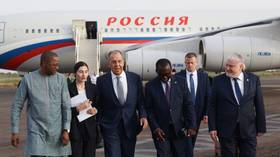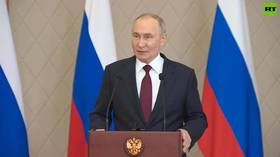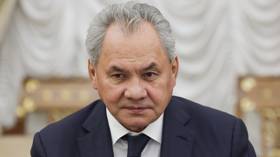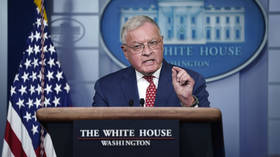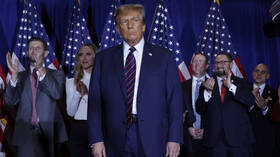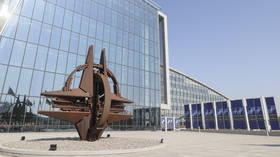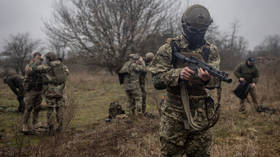Defense support, strengthening ties, countering Western propaganda: The key points from Lavrov’s African tour
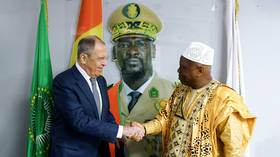
Russian Foreign Minister Sergey Lavrov has concluded his latest tour of Africa, visiting four countries in two regions of a continent where Western governments have expressed concern about their declining influence in recent years.
The top diplomat began his trip on Monday, first stopping in Guinea before moving on to the Republic of the Congo, Burkina Faso, and finally Chad on Wednesday.
Lavrov’s trip was aimed at assessing the growth in relations between the countries he visited and Moscow, as well as engaging in fresh negotiations he described as “mutually beneficial.”
Last summer, at the second Russia-Africa summit in St. Petersburg, Moscow pledged to strengthen ties with African countries and signed a number of agreements, including on defense cooperation, food security, education, and research.
During his meetings with officials on his tour, Lavrov reiterated the Russian government’s commitment to fulfilling these promises, according to statements released by the Foreign Ministry.
The Russian foreign minister arrived in Guinea early on Monday, marking his first visit to the West African nation since 2013.
He was welcomed to the capital, Conakry, by transitional president Mamadi Doumbouya, who has ruled the country since taking power in a coup in 2021. The Guinean leader has denounced attempts by Western powers such as the US and France to intervene in Africa’s political challenges as racist and condescending.
Lavrov and his Guinean counterpart, Morissada Kouyate, discussed a variety of issues and agreed for the two countries to collaborate on projects involving geological research, the development of mineral deposits, and health, according to Moscow’s Foreign Ministry.
Late on Monday, Lavrov arrived in the Republic of the Congo, with talks focused on defense cooperation and ending the Ukraine conflict.
The following day, during a press conference in Oyo, a city about 400km north of Brazzaville, Lavrov announced that Russia and the Congo will continue their intensive military and military-technical collaboration in the interest of “Congo’s defense capabilities.”
The Congo’s arsenal includes Soviet- and Russian-made weapons such as armored vehicles, rocket artillery, and helicopters. In May 2019, the Russian and Congolese defense ministries signed a contract to send Russian military specialists to the Congo to train and assist the Congolese army in the operation, maintenance, and repair of previously supplied military equipment and special assets.
Lavrov last visited the Central African state in July 2022, when Moscow and Brazzaville explored expanding collaboration in the sectors of energy and mineral resources, along with infrastructure development.
On Tuesday, the top Russian diplomat and his Congolese counterpart, Jean-Claude Gakosso, called for a peace plan for the Ukraine conflict that would include talks between the two main parties involved.
“It seems to me that those who send arms to Ukraine are not advocates of peace. Quite the opposite; they are those who challenge humanity, literally pushing us towards a worldwide conflict,” Gakosso stated.
Lavrov also commended the Congolese president, Denis Sassou Nguesso, for maintaining a “balanced” stance on Russia’s military actions in Ukraine.
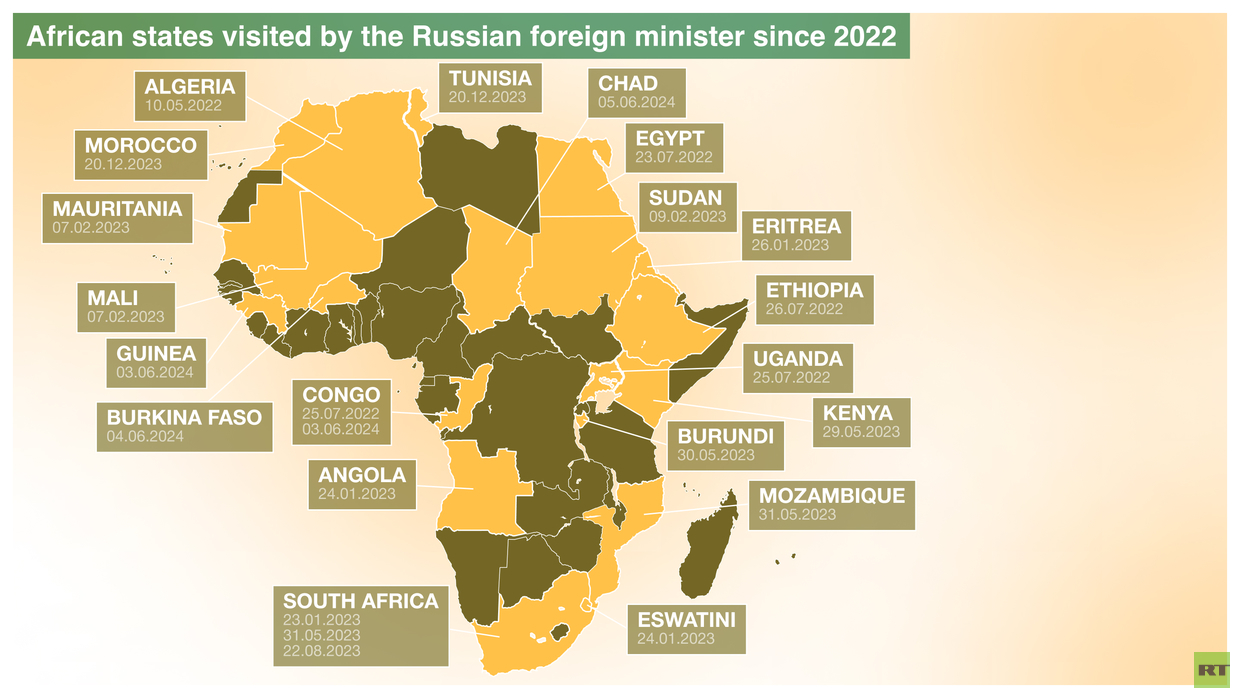
On Tuesday night, the minister arrived in Burkina Faso for his first visit in the history of Moscow-Ouagadougou relations. He met with Ibrahim Traore, the West African nation’s interim president, as well as Burkinabe Foreign Minister Karamoko Jean Marie Traore.
According to the Russian Foreign Ministry, the parties agreed to increase their already “strong” bilateral partnership in various sectors, with a focus on expanding cooperation in trade, economics, and humanitarian aid.
Lavrov commended the Sahel state for being the first to allow Moscow to reopen its embassy as part of Russia’s policy of revitalizing diplomatic missions in African countries. The mission, which had been closed since 1992, resumed operations last December following an agreement reached at the second Russia-Africa summit by interim leader Traore and President Vladimir Putin.
Burkina Faso is one of several former French colonies on the continent that have cut military ties with France in recent years and turned to Moscow for help combating terrorism in the Sahel. Islamic extremism has plagued the region since 2011, when NATO intervened on behalf of insurgents in Libya.
Paris and some of its Western counterparts, including the US, have accused Russia of pursuing predatory projects in Africa and spreading disinformation, but Ouagadougou and its allies, Mali and Niger, have welcomed Moscow as a strategic partner.
On Wednesday, Lavrov told reporters at a joint press conference in Ouagadougou with his Burkinabe counterpart, Karamoko Traore, that the US and its allies have maintained a colonial approach to international relations.
In response to a question on whether Russia intends to “oust” the US from Africa, Lavrov declared that Moscow is only building relations with “friends” on the continent based on mutual interests, benefits, and equality.
When Lavrov traveled to N’Djamena on Wednesday, he emphasized the importance of Russia-Chad relations and encouraged the two governments to focus on strengthening trade, economic ties, and investment interaction.
The diplomat told reporters that discussions with Chad’s foreign minister, Abderaman Koulamallah, had focused on “plans for the future” and the “strategic courses” outlined by President Putin and Chadian leader Mahamat Idriss Deby during a meeting in the Kremlin in January.
”We are developing cooperation in security. Chad is interested in it, considering that the terrorist threats in the region, associated with the destruction of Libyan statehood in 2011, persist,” Lavrov stated.
The foreign minister’s first visit to the Sahel state coincided with the 60th anniversary of diplomatic relations between the former French colony and the Soviet Union, which began in 1964.
It also came less than two weeks after Chad’s president, Mahamat Deby, was sworn in, having won the disputed May 6 election with 61% of the vote.
Mahamat Deby had ruled the landlocked nation since his father, Idriss Deby Itno,’s death and was said to be a close ally to Chad’s former colonial power, France. However, analysts, including Vsevolod Sviridov, an expert at the Center for African Studies at the Higher School of Economics in Moscow, believe the Chadian leader has been warming to Russia in recent months.
While in Moscow in January, Deby described his visit as “historic,” noting that “Chad and Russia have very long-standing relations.”
His visit came nearly six decades after the Central African nation’s former president, Francois Tombalbaye, visited Russia in 1968, according to Deby.
Anti-French sentiment has been growing in Chad, with opposition leaders issuing a joint statement last year demanding that French troops leave the country. Last October, Chadian political analyst Evariste N’Garlem Tolde told RT that the country does not need the French army for security, claiming their presence has resulted in an increase in terrorist activities.
Washington also announced plans to relocate military personnel stationed in Chad in April, after the landlocked nation’s government reportedly questioned whether an existing agreement covered US troops deployed at the only American airbase there.
On Wednesday, Lavrov pledged that Russia will continue to provide the Chadian army with weapons and military equipment to bolster its defense capabilities and ability to combat terrorism in the country, where the previous president, Idriss Deby Itno, lost his life fighting rebels in 2021.
